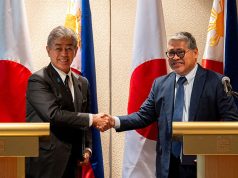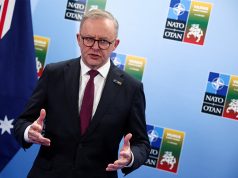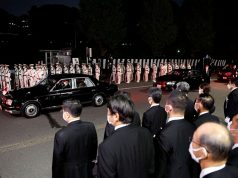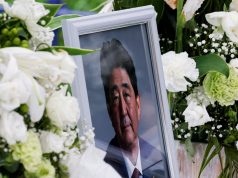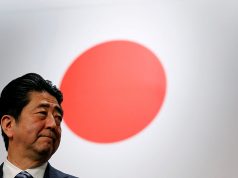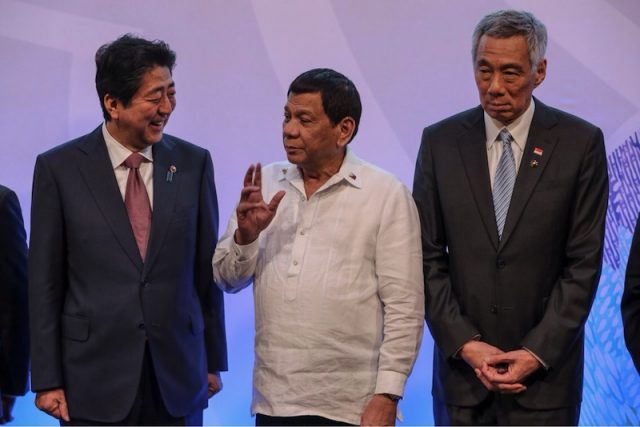
MANILA – Japanese Prime Minister Shinzo Abe vowed to deepen cooperation with the Association of Southeast Asian Nations (ASEAN) in various areas such as maritime security, defense, trade, infrastructure development, combating terrorism, disaster risk reduction and cultural exchanges.
Abe made the commitment during the 20th ASEAN-Japan Summit held at the Philippine International Convention Center in Pasay City on Monday, November 13. The summit was held as part of the 31st ASEAN Summit and Related Meetings being hosted by the Philippines this year.
“Japan will strongly push forward ASEAN by exercising leadership so that integration goes even further as a community,” Abe said in his opening remarks during the summit.
“Furthermore, we will cooperate in creating a resilient society, where all peoples of the region can exhibit in freedom their potential to the fore, enjoy peace and prosperity based on the rule of law and be able to actually feel the quality of life without inequalities,” he added.
Abe said Japan is willing to share with ASEAN member states its knowledge and experience in dealing with various challenges such as ageing with low fertility, environment and energy.
The Prime Minister likewise pledged to support ASEAN in quality infrastructure upgrading, sophistication of industrial structure and human resource development for the progress of the entire ASEAN region.
Connectivity, infrastructure
“Japan and ASEAN are promoting enhanced connectivity and improved industrial infrastructure by investing in quality infrastructure,” he said.
He said Japan will continue to expedite the Yen Loan Project and wishes to see the early conclusion of the Japan-ASEAN Technical Cooperation Agreement agreed upon at the Japan-ASEAN Foreign Ministers’ Meeting in August.
“At the same time, we wish to contribute to the Master Plan on Connectivity impact led by ASEAN,” the Japanese leader added.
Abe said Japan will also promote innovation, where Japanese and ASEAN companies collaborate so that the companies of ASEAN are not left behind the economic growth; and strong small and medium enterprises are created one after another.
He likewise took note of the bilateral currencies swap arrangement – concluded for the first time with the Philippines – where yen withdrawal is possible. “I hope this to cover other countries so as to seek financial stability within the region,” he said.
For peace and stability, Abe said Japan will work for the substantial upgrading of human resource development, provision of supplies and intellectual contribution in the ASEAN member states in order to develop free and open international orders based on the rule of law.
Maritime law enforcement
Abe committed to provide 55 billion yen in the next three years for enhancing maritime law enforcement capacity.
In response to the rising threat of terrorism in Asia, Abe said Japan continues to assist ASEAN nations fight terrorism and violent extremism.
“While we cooperate in reconstruction efforts in Marawi in the Philippines, we will also cooperate so as to support the government of Myanmar toward the improved situation in the Rakhine State,” he said. He was referring to the region where the Rohingya crisis – involving Myanmar’s Muslim minority who are deemed stateless – began.
In the area of partners for prosperity, Abe said he wishes to promote free trade by clearly presenting the importance of free and open trade and investment.
In the area of improving quality of life, Abe said Japan is committed to help ASEAN foster a society where people just don’t live long but can enjoy good health longer.
He said one way of achieving this is the Japan-ASEAN Environmental Initiative, which aims to cooperate for building a recycling-oriented society so that sustainable development goals are also attained in other areas of science and technology, disaster risk reduction and health.
In cultural and people-to-people exchanges, Abe cited 30,000 people in exchange program, 2.1 million persons in Japanese language partnership as well as the Japan-ASEAN Sports Ministers’ Meeting that was held in Japan for the first time last October.
In closing, Abe raised the nuclear and missile issues of North Korea calling it a “grave and imminent threat” that his country should never experience.
“We need to make North Korea change their policy by enhancing the pressure applied to North Korea to the highest level by all available means, including the full implementation of the Security Council’s resolutions,” he said.
Duterte thanks Abe
For his part, President Rodrigo Duterte, the Chairman of this year’s ASEAN, expressed his warmest congratulations to Prime Minister Abe on his reelection last month on behalf of other ASEAN leaders.
“ASEAN-Japan relations have matured into a strategic partnership for peace and stability, prosperity, quality of life, and mutual trust and understanding,” he said.
“We can trace the beginnings of today’s robust ASEAN-Japan relations to 1977, when the Fukuda Doctrine, being Japan’s foreign policy, approached towards a heart-to-heart relationship with our region,” he added.
“Based on equal partnership and 40 years later, Japan has become one of ASEAN’s strongest political dialogue partners and steadfast supporter of ASEAN centrality and community-building,” he further said.
He likewise thanked Abe for his Vision Statement, which he said “respects the ASEAN’s role in the regional architecture while espousing Japan’s proactive contribution to peace as a fundamental security principle.”
“In this light, we can expect a good executive report on the progress of the vision statement to ASEAN-Japan friendship and cooperation, which we adopted in 2013,” he ended.




